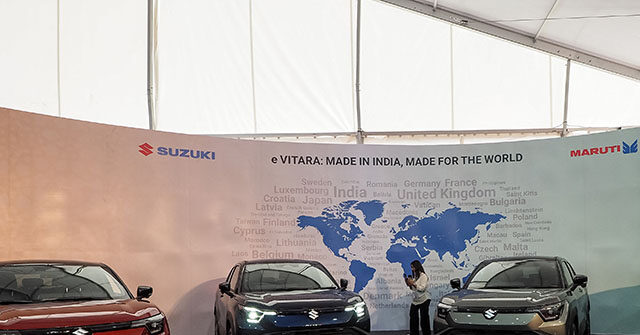Indian Prime Minister Narendra Modi on Tuesday inaugurated a factory in the town of Hansalpur that will manufacture an electric vehicle (EV) called the Maruti Suzuki e-Vitara.
The factory is also intended to begin domestic production of two older hybrid automobiles, the Grand Vitara and Invicto, along with producing batteries for the Grand Vitara hybrid.
Maruti Suzuki is the Indian subsidiary of Japanese automaker Suzuki. The company is currently one of India’s largest automakers. The battery plant in Hansalpur will be a collaboration between Suzuki, Toshiba, and global auto-parts maker Denso.
Modi said the launch of the Maruti Suzuki factory was the beginning of a “new chapter” for his “Make in India” initiative, which calls for India to manufacture more products domestically through joint ventures and co-production deals.
Modi was bullish on India’s ability to compete with reigning EV champion China. He said cars made in Hansalpur would be exported to customers in over a hundred countries around the world.
“India has the power of democracy, the advantage of demography and a very large pool of skilled workforce, making it a win-win situation for every partner,” he said.
“The world will drive EVs that say: ‘Made in India!’” Modi declared, although he was arguably even more excited about hybrid vehicles. He thanked Maruti Suzuki for making rapid progress on his idea to begin converting some of India’s older trucks and ambulances into hybrids.
Modi emphasized the importance of producing batteries for EV locally, noting that India has relied heavily on imported batteries until now. He warned about the inherent instability of stretching critical supply chains across national borders and touted the subsidies and other benefits provided by his “Make in India” program as a boon to industrial and national security.
During his inaugural ceremony for the EV factory, Modi said the next industry he would like to bring under the Make in India umbrella is semiconductors. He said six new semiconductor plants will soon be opened in India, and his government plans to support the development of the industry.
Modi also spoke warmly of India’s relationship with Japan.
“Japan will be our trusted partner to achieve our 2047 goals. We are made for each other and are trusted partners. You should be vocal for local and Swadeshi should be your life’s mantra,” he told the crowd in Hansalpur. “Swadeshi” means “self-reliance.”
“Anything made in India irrespective of the foreign investor or the colour of the currency used, should be considered Swadeshi including the cars manufactured by Japan’s Suzuki in India by the sweat and engineering silks of Indians,” he said.
India, and Japan, would have a fair distance to cover before they could catch up with China’s heavily subsidized EV industry. At the beginning of 2025, China accounted for over 60 percent of global electric vehicle production and 75 percent of EV batteries. There are roughly 200 brands of Chinese electric vehicles. The biggest Chinese automaker, BYD, registered 2.4 million new cars last year, compared to 1.8 million for the most successful U.S. brand, Tesla.
Read the full article here


